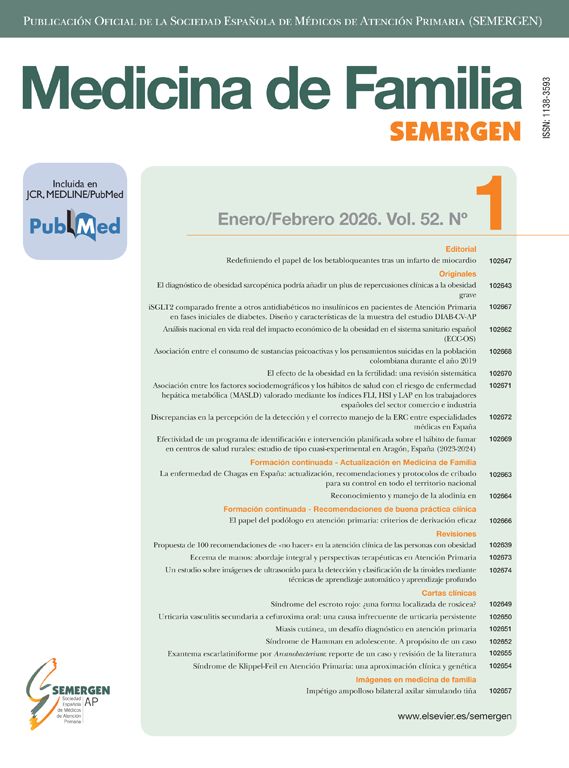El objetivo primario fue evaluar la tolerabilidad del inicio de tratamiento con miglitol según una pauta posológica progresiva. El objetivo secundario era valorar el cumplimiento terapéutico.
MétodosEstudio prospectivo, observacional y multicéntrico que incluyó 1.795 pacientes con diabetes mellitus tipo 2, tratados con miglitol en pauta posológica progresiva durante tres meses.
ResultadosLa incidencia de reacciones adversas fue disminuyendo a lo largo del estudio, desde un 19% (341/ 1.745) al mes de tratamiento hasta un 9,1% (155/1.708) tras completar los tres meses. Los efectos secundarios fueron en su mayoría de intensidad leve y de aparición ocasional y relacionados con el mecanismo de acción del fármaco. Sólo un 1,8% de los pacientes abandonaron el tratamiento por este motivo. El cumplimiento de la pauta se situó en torno al 90%.
ConclusionesMiglitol es un fármaco que, al igual que otros inhibidores de las alfa-glucosidasas, presenta un perfil de reacciones adversas relacionadas con su mecanismo de acción.
La incidencia de reacciones adversas de miglitol puede disminuir si el tratamiento se inicia con dosis bajas y se aumenta la pauta progresivamente, mejorando la tolerabilidad a lo largo de las semanas de tratamiento.
El cumplimiento por parte de los pacientes de la pauta progresiva de miglitol prescrita por el médico se sitúa aproximadamente en el 90%.
The primary objective was to assess tolerability of the onset of treatment with miglitol according to a progressive posological regime. The secondary objective was to assess therapeutic compliance.
MethodsProspective, observational and multicenter study that includes 1,795 patients with type 2 diabetes mellitus, treated with miglitol in progressive posological regime for 3 months.
ResultsThe incidence of adverse reactions decreased during the study from 19% (341/1,745) at one month of treatment to 9.1% (155/1,708) after completing 3 months. The side effects were mostly of mild intensity and occasional appearance and related with the drug action mechanism. Only 1.8% of the patients dropped out of the treatment for this reason. Regime compliance was at about 90%.
ConclusionsMiglitol is a drug which, like other alpha- glucosidase inhibitors, presents an adverse reaction profile related with its action mechanism.
The incidence of adverse reactions of miglitol can decrease if the treatment is initiated with low doses and the regime progressively increased, improving tolerability during the weeks of treatment.
Compliance by the patients of the progressive regime of miglitol prescribed by the physician is at about 90%.






